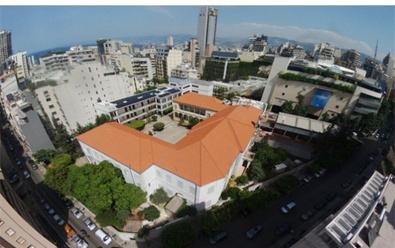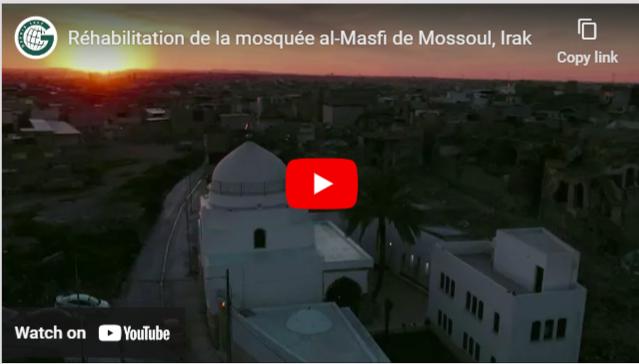
Partnering for heritage!

Dear reader,
On behalf of ALIPH, we would like to extend our warmest wishes for the holy month of Ramadan.
At a time marked by ongoing wars and crises in too many countries, ALIPH is determinedly pursuing its commitment to protecting damaged or endangered heritage, such as it has been doing in Ukraine for the past two years. The Foundation has also released an initial envelope of USD 1 million to fund emergency measures to protect Gaza's heritage, which will be implemented as soon as possible, and without undermining the priority for delivering humanitarian aid and protecting civilians.
Against this dark backdrop, however, there are glimmers of hope: in Beirut and Mosul, on 5 and 7 March respectively, ALIPH and its partners inaugurated a total of four sites or monuments of strong architectural and social importance. These rehabilitation projects were funded and supported by ALIPH either for several months, or, in some cases, several years. Each of these initiatives has contributed to training and employing local professionals and will foster the revitalization of the cultural, educational, and social fabric of both cities.
Al Masfi Mosque, Mosul (Iraq), inaugurated on 7 March 2024 © ALIPH - Azhar Al-RubaieAn initial envelope of USD 1 million to support emergency measures to safeguard Gaza's cultural heritage
First and foremost, ALIPH's thoughts are with all the victims, their families, and loved ones in this conflict between Israel and Hamas.
This war has also had a significant impact on Gaza's heritage. Various archaeological sites, religious buildings, historic houses, museums, archives, and libraries have been destroyed or damaged. ALIPH has therefore adopted an initial envelope of USD 1 million to support emergency measures to safeguard Gaza's heritage. These measures will be implemented as soon as possible, and without undermining the priority for delivering humanitarian aid and protecting civilians.
Since the beginning of the conflict, the ALIPH Secretariat has been in close contact with the Palestinian heritage authorities in Ramallah, heritage organizations, and local NGOs to assess the situation and to prepare for future interventions.
ALIPH is ready to support projects that will assess the situation, urgently document immovable or movable heritage, reinforce the capacities of local professionals to clear and shelter collections, provide emergency stabilization or restoration for artifacts, and set up preventive protection measures to sites or collections.
Inauguration of four monuments restored with ALIPH’s support in Beirut and Mosul
On the 5 and 7 of March 2024, ALIPH and its local and international partners inaugurated four major monuments in Beirut and Mosul respectively, all rehabilitated with the Foundation’s support for a total of USD 3,378,205 The two sites in Beirut are a historical house, which are the headquarters of a Sunni charitable association, and a Greek Orthodox school in Beirut In Mosul, the sites are the Al-Masfi mosque and a palatial house, known as the Tutunji House
The two projects that were inaugurated in Beirut, in the presence of the Chair of the ALIPH Foundation Board, Bariza Khiari, are part of ALIPH’s Action Plan to Protect Beirut’s Old City, launched after the explosion on 4 August 2020. Very quickly after the tragedy, ALIPH intervened to support the stabilization of some forty historical houses and the restoration of ten cultural institutions, including the National Museum of Beirut and the Sursock Museum, as well as religious institutions such as the Maronite Cathedral of Saint George and Saint George Greek Orthodox Cathedral.

 Bariza Khiari, Chair of the ALIPH Foundation Board, at the Zahrat El Ihsan School inauguration, 5 March 2024, Beirut (Lebanon) © Thomas Raguet
Beirut
Bariza Khiari, Chair of the ALIPH Foundation Board, at the Zahrat El Ihsan School inauguration, 5 March 2024, Beirut (Lebanon) © Thomas Raguet
Beirut
Al Makassed Villa, Beirut
The Villa Al Makassed is a late 19th-century palatial house and the headquarters of the Sunni charitable Foundation Al Makassed, founded in 1879. It is home to a library of 35,000 books – the largest collection of publications on Islam in Lebanon – which henceforth will be open to the public. This project, led by the Institut Européen de Coopération et de Développement (IECD), in cooperation with the General Directorate of Antiquities of Lebanon, has enabled the restoration of a building of high architectural and social importance, contributed to preserving the social fabric of the area, and trained 74 youth – nearly 30% of whom are women – in heritage restoration skills and trades as a means of integrating them into the job market. ALIPH supported this project with a grant of USD 795,409.


For more information on this project, please watch the video © IECD
 Al Makassed Villa, Beirut (Lebanon), May 2023 © IECD
Al Makassed Villa, Beirut (Lebanon), February 2024 © IECD
Al Makassed Villa, Beirut (Lebanon), May 2023 © IECD
Al Makassed Villa, Beirut (Lebanon), February 2024 © IECD
Zahrat El Ihsan Greek Orthodox School, Beirut
The Zahrat El Ihsan Greek Orthodox School is one of the oldest schools in Beirut, founded in 1881 to educate young girls. This institution, which today welcomes almost 1,000 girls and boys, comprises a school, an orphanage, a convent, and a church, and it was greatly damaged by the explosion on 4 August 2020. Following initial consolidation work, the reconstruction of the traditional wooden frame and tiled roof have now been completed. This project was led by Œuvre d'Orient, in partnership with the Greek Orthodox Archdiocese of Beirut, and co-financed by these two partners as well as by ALIPH and Hungary Helps. ALIPH provided USD 356,086 over the entire course of this project.


Rehabilitating Mosul's heritage has been a priority since ALIPH’s creation in 2017. In 2019, the Foundation launched its “Mosul Mosaic” program, with projects to rehabilitate two churches, two mosques, the Mosul Museum, as well as several sites and monuments as a contribution to the “Reviving the Spirit of Mosul” initiative of UNESCO and the Iraqi government.
The inaugurations of the Al Masfi mosque and the Tutunji house, two of ALIPH's flagship projects in Mosul, marked the culmination of outstanding teamwork between the Foundation and its local and international partners. The results are remarkable, not just architecturally, but also from social and cultural perspectives.

 Mosul Sufi Muwashahat Band at the inauguration of Al Masfi mosque, Mosul (Iraq), 7 March 2024 © Azhar Al-Rubaie
Zahrat El Ihsan school, Beirut (Lebanon), 2023 © Oeuvre d'Orient
Zahrat El Ihsan school, Beirut (Lebanon), 2024 © Oeuvre d'Orient
Mosul
Mosul women preparing traditional deserts inside the Tutunji house during the inauguration, Mosul (Iraq), 7 March 2024 © Azhar Al-Rubaie
Mosul Sufi Muwashahat Band at the inauguration of Al Masfi mosque, Mosul (Iraq), 7 March 2024 © Azhar Al-Rubaie
Zahrat El Ihsan school, Beirut (Lebanon), 2023 © Oeuvre d'Orient
Zahrat El Ihsan school, Beirut (Lebanon), 2024 © Oeuvre d'Orient
Mosul
Mosul women preparing traditional deserts inside the Tutunji house during the inauguration, Mosul (Iraq), 7 March 2024 © Azhar Al-Rubaie
Other projects currently underway in Mosul and supported by ALIPH include the rehabilitation of the city's museum and its artifacts destroyed by Daesh, in a project led by an international consortium (Iraq State Board of Antiquities and Heritage (SBAH), Mosul Museum, musée du Louvre, Smithsonian, and World Monuments Fund); the restoration of the Mar Toma Syriac Orthodox and Al Tahira Chaldean churches, led by Œuvre d'Orient in partnership with the Archbishops, the SBAH, the French Institut National du Patrimoine (INP) and Ecole de Chaillot; the restoration of the Al-Raabiya Mosque, led by Archi. Media Trust Onlus, the SBAH, the University of Mosul, the Sunni Waqf and the University of Florence; and the protection of the recently discovered 2,700-year-old monumental statue of the winged Assyrian deity "lamassu," in partnership with the French archaeological mission in Khorsabad and the SBAH.
Al Masfi Mosque, Mosul
The project to restore the Al Masfi mosque was led by the NGO La Guilde, in close collaboration with the SBAH, Mosul's Sunni Waqf, the Institut National du Patrimoine, and the Ecole de Chaillot (Paris). This Mosque stands on the site of Mosul's oldest mosque, presumably built in 638 CE. It was heavily damaged during the occupation of Mosul by Daesh. Situated between the Al Nouri Mosque and the Tigris River, it is once again able to welcome its community. ALIPH supported this project with a grant of USD 1,079,320.


For more information on this project, please watch the video © La Guilde Européenne du Raid
 Al Masfi Mosque, Mosul (Iraq), June 2021 © La Guilde Européenne du Raid
Al Masfi Mosque, Mosul (Iraq), November 2023 © La Guilde Européenne du Raid
Al Masfi Mosque, Mosul (Iraq), June 2021 © La Guilde Européenne du Raid
Al Masfi Mosque, Mosul (Iraq), November 2023 © La Guilde Européenne du Raid
The Tutunji House, Mosul
The restoration of the Tutunji House was a joint effort between the University of Pennsylvania’s Iraq Heritage Stabilization Program (IHSP), the SBAH, and the University of Mosul. Built between 1808 and 1817 and lavishly decorated with bas-reliefs in traditional local marble, this patrician house is a symbol of the city's past as a flourishing center of international trade. Used by Daesh as an explosives factory during their occupation of the city (2014-2017), it was almost completely destroyed during the liberation war. It will now host a museum about the city, as well as concerts organized by the SBAH and a local youth association. The ALIPH grant for this project amounted to USD 1,147,390.


For more information on this project, please watch the video © ALIPH
 The Tutunji house, Mosul (Iraq), November 2019 © IHSP
The Tutunji house, Mosul (Iraq), March 2024 © Azhar Al-Rubaie
The Tutunji house, Mosul (Iraq), November 2019 © IHSP
The Tutunji house, Mosul (Iraq), March 2024 © Azhar Al-Rubaie
ALIPH's continues its commitment to protect cultural heritage in Ukraine
For the past two years, ALIPH has been mobilized to protect Ukraine's cultural heritage. To date, the Foundation has committed nearly USD 7 million to support nearly 400 Ukrainian organizations in over 140 locations throughout Ukraine.
This funding falls under six pillars:
Support to museums, libraries, archives, and cultural heritage institutions to purchase storage equipment, packing materials, fire safety equipment, as well as power supplies, climate control systems, and materials to secure buildings;
The creation of a dozen "refuges" in Ukraine – storage areas to protect artworks and artifacts;
The creation of “heritage ambulances” to enable Ukrainian conservators and restorers to intervene rapidly to protect and restore works of art damaged by the war. This has enabled them to complete 300 conservation missions;
Stabilization of historical buildings damaged in Kharkiv and Odesa;
3D documentation and photogrammetry of more than 40 monuments at risk; Direct support to 450 heritage professionals.
To enable all its work in Ukraine, ALIPH has received funding from its members, State and private donors, as well as from the European Union (Foreign Policy Instruments, EUR 4 million), Getty (USD 1 million), and the Principality of Monaco (EUR 40,000).
In addition, in February 2024, ALIPH received support from the U.S. Ambassadors Fund for Cultural Preservation in the amount of USD 645,000 to contribute to protecting archives in Ukraine.
For more information on this project, please watch the video © ALIPH

A big thank you to all our donors
ALIPH carries out its work thanks to the support of its:
Member States:
France | United Arab Emirates | Saudi Arabia | Kuwait | Luxembourg | China | Morocco | Cyprus
Private donor members:
Dr. Thomas S. Kaplan | J. Paul Getty Trust | Fondation Gandur pour l'art Host country, Switzerland
External donors for earmarked projects.
